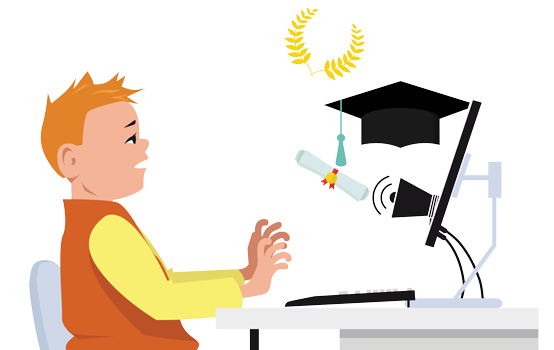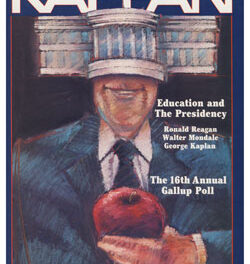A glitzy invitation to join a “prestigious” honor society may look like a great opportunity, but these organizations’ promises are often empty.
We in the United States want to believe all students will be given equal educational opportunities — that impulse informs the name of such laws as the Every Student Succeeds Act. However, one doesn’t have to look far to realize that some students have better chances than others. Nowhere is that more evident than in the fierce competition to get into prestigious colleges (Lou & Griggs 2019; Steele, 2019). Hoping to boost their children’s chances for admission, some wealthy parents are willing to spend millions of dollars, whether through legal gifts to university endowments or illegal payments to consultants and university staff, as we saw in the Varsity Blues scandal.
But for all the shock and outrage that Varsity Blues has generated, the scandal shouldn’t have come as a surprise. Profiteers have marketed dubious awards to students, parents, and schools for decades without raising eyebrows. Capitalizing on the fantasy that getting into the “right” college is a surefire ticket to success, predatory businesses have exploited millions of children by encouraging them to acquire fake or low-value “honors.” Unlike the corrupt officials in the Varsity Blues scandal, though, these edu-businesses have mostly targeted middle-class students looking for a leg up with college admissions and scholarships (though, in recent years, first-generation college students and vulnerable, at-risk, and immigrant students have become frequent targets as well).

Getty Images
Aware that their children don’t have the same opportunities as wealthy students, many middle- and working-class parents are ready and willing to purchase anything that might bolster their children’s applications. What they may not realize, however, is that no matter the promises made by those who peddle such awards, certificates, and memberships, buying these products has little to no effect on admissions and financial aid decisions. College and university staff give no credence to most of these so-called honor societies (Vissing, 2019).
Further, few parents understand that these societies operate within a larger network of other edu-business, test-prep services, and corporations that acquire and share student data in a series of reciprocal deals. When one organization acquires information, it then transfers it to others (Russell et al., 2018; Singer, 2018), and parents and children soon find themselves pressured to purchase a whole range of products and services that promise to help them achieve their college dreams, but which in fact do nothing to help them get into or pay for college.
Marketing honor for a profit
Founded by the National Association of Secondary School Principals in 1921, the National Honor Society (NHS) is one of the oldest, largest, and best-regarded school honor societies. As of 2014, it (along with its spin-off, the National Junior Honor Society) boasted a membership of 1.6 million students (from 94 countries) deemed high achievers in the areas of scholarship, leadership, service, and character (NASSP Student Programs, 2014).
The credibility of NHS has always rested in its strict selection criteria — from the start, it has admitted only a small percentage of high school students. As an unintended consequence, however, this created a large and easily identifiable pool of students who were not admitted. Seeing these students as a potentially lucrative market, entrepreneurs soon began to create, market, and sell “honors” of their own, and over time, these dubious, for-profit business came to vastly outnumber the more credible societies they mimicked.
Today, students targeted by these groups receive letters of invitation so sophisticated that few people think to question their legitimacy. Those who decide to check out their websites will find well-crafted pages devoted to enticing “opportunities” — including promises that if students pay $60-$100 to join, they will receive access to events and benefits that sound too good to be true, and usually are. In reality, once they pay the initial fee, students are then invited to pay thousands of dollars more for access to trips, meetings, memorabilia, and competitions. Hundreds of these multimillion-dollar honor-type societies exist, often hovering at the outside edge of the law, offering specious awards and programs to honor wannabees.
These organizations may offer scholarships, but the money they give out in awards tends to add up to only a small fraction of what they bring in through fees. For example, large numbers of students may receive as little as $25. And while some students might receive $100-$500 scholarships — and a few will receive $1,000 or more — larger awards are rare, meant only to create the appearance of legitimacy. Of course, the lucky recipients of these scholarships will have their pictures plastered on organization websites, and press releases will be sent to their hometown newspapers. In turn, the awards announcements themselves become lucrative marketing and recruitment campaigns for future applicants. Further, teachers and schools may be awarded honors, money, or perks for recruiting more students, and so they inadvertently become accomplices in this convoluted scheme.
It is difficult to get a full picture of these organizations’ finances, but many of them appear to make a great deal of money. For example, according to its annual report, the net assets of the Golden Key International Honour Society — with chapters at hundreds of college campuses around the world — totaled more than $7 million in 2016, but it awarded just $490,339 in scholarships that year. (Since its founding in 1977, Golden Key has been criticized many times for its sketchy business practices; for example, see Brownstein, 2002).
How do these organizations obtain student names and contact information, and other data? In some cases, they purchase information provided when students take exams like the PSAT, SAT, or ACT or participate in seemingly legitimate surveys about their college plans. The College Board, for example, gives students taking their exams the opportunity to check a box if they want to participate in the Student Search Service and to receive information about colleges, scholarships, and educational programs (College Board, n.d.). And Scholarships.com, an online scholarship search service, is affiliated with American Student Marketing, which sells student data to a variety of vendors (Singer, 2018). Depending on the particular organization’s policies, the information students share could make its way not just to colleges but also to credit card companies, student loan providers, and other businesses — including honor societies. Protections for student privacy exist, but it’s difficult for students to know what they’re giving away, how to opt out, or what to do when their information is sold without their knowledge.
Many honor societies are even more closely associated with marketing companies, banks, and other vendors. For example, to entice students to join particular societies, corporate sponsors often provide discounts or promotional offers on their products, and in return those sponsors receive access to student data and, sometimes, cushy appointments to honor societies’ boards. Moreover, the lines between honor societies and these other businesses sometimes blur entirely. For instance, EnvisionEMI — a for-profit honor society, focusing on career exploration and leadership — hired John Richards, former marketing director of Starbucks, Four Seasons Hotels, and Elizabeth Arden, to promote its tuition-based programs (Small, 2012). And in 2005, Nelnet, a student loan servicer, acquired both the Student Marketing Group and the National Honor Roll, bringing student loans, data collection and sales, and an honor society together under the same roof.
Identifying the players
Most people find it difficult to judge whether a given honor society is legitimate — and this is by design. Websites, letters, and promotions tend to be slick and polished, and they offer at least the appearance of genuinely valuable programs and products. According to the Financial Fraud Research Center:
Successful fraud looks just good enough to be true. By mimicking the persuasive strategies, communication streams, and payment mechanisms of legitimate commerce, skilled fraudsters give few indications that their offers are scams. Fraudsters’ methods anticipate informed, skeptical consumers by providing numerous markers of legitimacy, authenticity, and appeals to trust. (Deevy, Lucich, & Beals, 2012, p. 6)
Students who want to go to college but aren’t sure of their chances tend to be most susceptible to such practices, especially when marketers massage their egos and promise opportunities that otherwise seem unattainable. Many young people are thrilled and flattered to receive letters identifying them as top students and inviting them to join honor societies, and those who are insecure about their potential for success are particularly susceptible to such manipulation. In turn, their parents — whose own egos are boosted by the success of their children — can often be tempted to pay membership fees and purchase products right away, without taking a hard look at the organization.
Financial fraud involving children and youth is a major, yet understudied problem. Existing research indicates young people are more likely to be victims of financial fraud than older adults (Deevy, Lucich, & Beals, 2012; Titus, Heinzelmann, & Boyle, 1995). However, the public is unaware of how much financial fraud occurs because so many people are embarrassed to admit to being defrauded or don’t know how to go about seeking restitution. In addition, no federal oversight or professional organizations monitor proprietary honor societies targeting elementary and high school students, enabling them to fly under the radar. And even if these groups’ actions are not technically illegal, taking families’ money while providing minimal-to-no benefits could certainly be characterized as unethical (Baker, Gentry, & Rittenberg, 2005; Friedrichs, 2009) and worthy of the education community’s attention.
Growth in the face of complaints
Although these honor societies tend to skate right up the edge of the law, rarely committing outright fraud, they have been subject to numerous consumer complaints, and allegations of false advertising, financial manipulation, and exploitation. For example, the National Honor Roll had its business suspended in 1987 by the California Franchise Tax Board for failure to pay taxes, and the state barred schools from doing business with Outstanding High School Students of America (Bishop, 1988). EnvisionEMI was sued for $17 million for misrepresentation and failure to deliver programs at Barack Obama’s Presidential Inauguration Leadership Summit (Radosti v. Envision EMI, 2010). The Better Business Bureau lists complaints from parents who paid money for children to receive services that they didn’t receive and that Envision refused to refund.
Similarly, Hew Joiner, past president of the National Collegiate Honors Council (a coalition of honors program directors at 800 colleges), criticized Golden Key as “an organization with very low standards and very high fees,” which “undermines the legitimate function of those societies that want to recognize genuine student achievement” (Brownstein, 2002). And when Golden Key sought membership in the Association of College Honor Societies, a watchdog group for higher-education honor societies, it was turned down three times (Wyatt, 2002). Golden Key’s founder, James Lewis reportedly responded by threatening libel suits and antitrust law violations (Brownstein, 2002).
Two years after being “forced out” of the organization (Brownstein, 2002), Lewis created a similar model to recruit high schoolers, the National Society of High School Scholars (NSHSS). Since then, dozens of parents and students have accused NSHSS of deceptive sales tactics — a simple online search will reveal numerous comments (at sites such as College Confidential and Yahoo Answers) complaining of the group’s practices. NSHSS’s promotional materials frequently call attention to co-founder Claes Nobel’s status as a “member of the family that established the Nobel Prizes,” which could easily lead students and their parents to believe that the organization is somehow affiliated with the Nobel Foundation — it is not. Claes Nobel is only a distant relative of one of Alfred Nobel’s brothers. (This kind of hedging is part of these types of organization’s designs. For more examples, see Schemo, 2009; Singer, 2018; Smith, 2007; Steinberg, 2010; Vissing, 2019.)
Educators’ responsibilities
All of this leaves me with a number of questions: To what degree are any of today’s honor societies actually providing high-quality, tangible benefits for students? Are they really honoring students or just looking out for their own financial interests? Has the concept of honor been diluted to mean little more than a distinguished-sounding entry on a resume? And how can we as teachers protect the best interests of all children and not allow ourselves or our students to be manipulated by glitzy edu-business promotions?
Has the concept of honor been diluted to mean little more than a distinguished-sounding entry on a resume?
Dubious honor societies have proliferated for several reasons. One, they massage the egos of students, parents, and teachers. Two, they allege they can improve student success, particularly their chances of college admission and scholarships in a time of fierce competition. Three, they espouse culturally embraced values of honor, diversity, leadership, and achievement. Four, they use slick social media and marketing techniques that make them look legitimate. Five, when faced with complaints and lawsuits, they’ve paid attorneys, corporations, marketing strategists, and business experts to keep their reputations intact. Six, they are part of a growing edu-business community in which it is difficult to sort the legitimate actors from the swindlers. Seven, they offer just enough awards to cover themselves legally while providing minimal benefits to a few students and no tangible benefits to most.
These societies have no legitimate oversight organizations, and many families find it difficult to impossible to navigate the legal hurdles that will enable them to get their money back once they’ve been duped. So there is every reason to expect that profits, and lack of accountability, will continue to drive them forward. The best way to stop them is to make others aware of their scams, stop nominating students, discourage students from buying into such programs, and better protect student information so it’s not sold to companies who make money off children. Instead, develop local programs that honor students without picking their pockets.
A culture of competition has festered an honor society frenzy, turning honor into currency that can be bought and sold (Steinberg, 2010). Yet teachers and schools hold the keys that open doors to true student honor and success. Curtailing these swindles would be an honorable thing for educators to do.
References
Baker, S.M., Gentry, J.W., & Rittenburg, T.L. (2005). Building understanding of the domain of consumer vulnerability. Journal of Macromarketing, 25 (2), 128-139.
Bishop, K. (1988, July 27). Education: A warning on student directories. The New York Times.
Brownstein, A. (2002, March 22). Dishonest societies. Chronicle of Higher Education.
College Board. (n.d.). Student search service. https://collegereadiness.collegeboard.org/about/benefits/student-search-service
Deevy, M., Lucich, S., & Beals, M. (2012). Scams, schemes and swindles: A review of consumer financial fraud research. Stanford, CA: Stanford University, Financial Fraud Research Center.
Friedrichs, D.O. (2009). Trusted criminals: White collar crime in contemporary society (4th ed.). Belmont, CA: Wadsworth.
Golden Key International Honour Society. (2016). 2016 Annual Report. Atlanta, GA: Author.
Lou, M. & Griggs, B. (2019, April 3). Acceptance rates at top colleges are dropping, raising pressure on high school students. CNN.
NASSP Student Programs. (2014). NASSP student programs service report. Reston, VA: National Association of Secondary School Principals.
Radosti v. Envision EMI, LLC. (2010). 760 F. Supp. 2d 73
Russell, N.C., Reidenberg, J.R., Martin, E., & Norton, T.B. (2018). Transparency and the marketplace for student data. Virginia Journal of Law and Technology, 22, 107.
Schemo, D. (2009, April 13). Congratulations you are invited. It’s an honor (it’s a sales pitch). New York Times.
Singer, N. (2018, August 3). For sale: survey data on millions of high school students. CNBC.
Small, V. (2012, June 15). Behind the career of John Richards of Envision. Washington Post.
Smith, W. (2007, April 8). Marketers target kids who seek an edge. Orlando Sentinel.
Steele, H. (2019). Analyzing college admissions and acceptance rates over time. Business Student.
Steinberg, J. (2010, January 4). If everyone is in an honor society, has honor been cheapened? New York Times.
Student Marketing Group. (2005, April 1). Student Marketing Group and National Honor Roll announce acquisition by Nelnet [Press release]. Lincoln, NE: Nelnet.
Titus, R., Heinzelmann, F., & Boyle, J. (1995). Victimization of persons by fraud. Crime and Delinquency, 41 (1), 54-72.
Vissing, Y. (2019). The Question of Honor. www.yvonnevissing.com/2019/03/23/the-question-of-honor
Wyatt, K. (2002, April 21). Golden Key shows tarnish, critics say. The Washington Post.
Editor’s note: This article has been updated since the original version to correct some potentially misleading statements related to the National Society of High School Scholars.
ABOUT THE AUTHOR

Yvonne Vissing
YVONNE VISSING is a professor of healthcare studies and director of the Center for Childhood and Youth Studies at Salem State University Salem, MA. She is the author of Changing the Paradigm of Homelessness .










